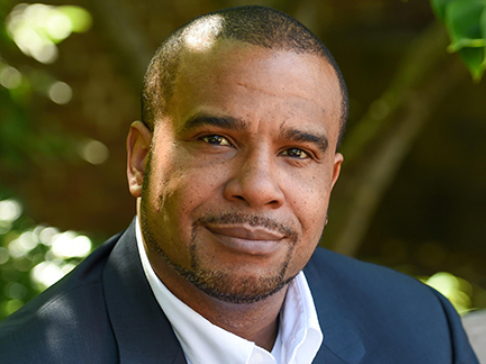Image courtesy of Connecticut College.
By the fifth grade, Dr. Rodmon King was already aware of inequities in the education system. He recalls being assigned a project on European explorer Marco Polo, and when he pushed back, his teacher reassigned him South African anti-apartheid activist Steve Biko. Recently hired by Connecticut College as the new Dean of Institutional Equity and Inclusion, he considers this a foundational awareness-raising moment.
King did not always anticipate working in the realm of educational equity. As an undergraduate at Roberts Wesleyan, he started studying astrophysics and then switched to mathematics before settling on philosophy. Specifically, he was interested in the questions about justice that were posed in philosophy. King still uses his philosophy background in his work today. “When you’re dealing with large-scale initiatives…it comes down to arguments and evidence within the context of a value system,” he explained.
After earning his BA, MA, and PhD in philosophy, King spent ten years teaching philosophy at Hobart and William Smith Colleges. During this time, he received a request that surprised him: to advise the Black Student Union. “That changed my academic career,” King expressed, “that led me to go into shared governance.”
He had attended predominantly white institutions and recalls knowing all of the Black students because there were so few of them; this made him determined to implement structural changes in order to improve the student experience for everyone. His focus was on the development of inclusive community-based models in which the voices of BIPOC students were valued.
While at Hobart and William Smith, King co-founded ‘Tools for Social Change,’ a dialogue-driven initiative to advance equity in the Finger Lakes region. He described this experience as “interesting and unfortunate.” Tools for Social Change began after the police-involved murder of a person of color in Geneva, NY. Following the shooting, he collaborated with two of his colleagues and they had the idea to train community members on how to protest and create social change. However, according to King, the initiative “became something entirely different.”
Some issues that Tools for Social Change tackled were the lack of BIPOC representation in the local government and the food deserts that existed in local neighborhoods. The initiative inspired many people of color to run for local government, and King noted that one person who ran is still a big part of police reform in Geneva today.
King’s leadership at Connecticut College will likely be influenced by a few key decisions from his time with Tools for Social Change. King and his colleagues used a dialogic model to achieve collective power building in the local community. This proved itself to be more inclusive and effective than social justice training sessions, in which the voices of each community member may not be heard. He described this project as an “organic process to create human connections between people” with no hierarchy. He did not want to be called “Dr. King” because that title established him as superior to the community members; he preferred a horizontal distribution of power.
After working as the Associate Vice President for Academic Affairs and Diversity Initiatives at Centre College in Kentucky, King landed at SUNY Oswego, where he created the first division of diversity, equity and inclusion and took on large responsibilities for the SUNY system as a whole. Here is where King created lasting change in the New York public college system. Curriculum on diversity, equity, and inclusion became a requirement for all students at Oswego, and other SUNY schools soon followed. Even in math or physics, diversity, equity, and inclusion principles can be applied. Students should not have to study history or the social sciences to learn about equity; they should learn how to be an inclusive citizen in all of their classes.
King was drawn to Connecticut College because the job posting required full participation in the community. King loves working in collaboration with faculty, staff, and students in order to make change, and he saw himself doing that at Conn. He originally knew very little about the college, but meeting the staff members with whom he would be working “sealed the deal.”
While impressed by Conn’s DIEI programming, King also sees challenges ahead. Regarding Conn’s Equity and Inclusion Action Plan, King hopes to strengthen gender inclusion, include all stakeholder groups (faculty, students, and staff), improve infrastructure at Conn, improve policies and staffing in the Title IX department, and expand accessibility services and religious services. “Every community is on a journey,” King said, “so is Conn College.” He seeks to diversify faculty hires, and emphasized that he feels equal eagerness from the staff members he has met so far.
“Institutional equity and inclusion is really everybody’s work and requires everybody to do it,” King asserted. He noted that if people think about the concepts of antiracism, feminism, and other social justice movements without using the labels, they sound like common sense. “Discourse creates barriers in peoples’ minds,” he said. King hopes to use these ideas of inclusivity to inspire change within the Connecticut College community.
Outside of work, King has loved making music since he was a teenager, and it is a large part of his cultural identity. King plays the guitar and bass in addition to writing his own music, and he has even made musical instruments before. King also has a strange obsession with “really, really bad movies,” intrigued in particular by people who made movies that they thought would turn out great, but ended up being terrible.
King encourages anyone interested in contributing to his work at Conn to reach out to him or visit his office in Unity House—his hopes are to partner with faculty, staff, and students who “want to envision ways that the world can be different.” He concluded, “dreaming beyond limitations is how growth and change happens.”










